I can solve this with several foreach-statements but it takes forever to load the page when it’s 26 students in every class and some subjects have up to 13 ’radnummer’. See examples below.
This what I prefer the output to be (rows and columns):

The problem: it takes forever to load.
Question: how do I speed it up and make more efficient?
Table one where I select all the students in a class (SELECT 1):
SELECT `intressenter_alla`.id, `intressenter_alla`.fornamn, `intressenter_alla`.efternamn
FROM `intressenter_alla`
INNER JOIN `klass_elev`
ON `intressenter_alla`.id = `klass_elev`.id
WHERE (`klass_elev`.klass = :klassen)
ORDER BY `intressenter_alla`.efternamn, `intressenter_alla`.fornamn ASC
PRINT_R gives:
Array (
[0] => Array (
[id] => 1226
[0] => 1226
[lid] => 0
[1] => 0
[fornamn] => Peter
[2] => Peter
[efternamn] => Strobe
[3] => Strobe
[personnr] => 070920-8690
[4] => 070920-8690
[mejl] => peter.strobe@mail.com
[5] => peter.strobe@mail.com
[6] => 1226
[klass] => 6B
[7] => 6B
)
[1] => Array (
[id] => 1227
[0] => 1227
[lid] => 0
[1] => 0
[fornamn] => Victor
[2] => Victor
[efternamn] =>Gand
[3] => Gand
[personnr] => 070518-8995
[4] => 070518-8995
[mejl] => victor.gand@mail.com
[5] => victor.gand@mail.com
[6] => 1227
[klass] => 6B
[7] => 6B
)
)
Table two where I select corresponding data to each student. Here there is a problem. In this example each student should have five rows of ’radnummer’ (se below) for this particular subject. Only the last one shows up. On each row a specific value ’kunsk_klick’ are supposed to show up. See example below (SELECT 2):
SELECT *
FROM `iup_kunskapskrav_klick`
WHERE elev_id = ? AND radnummer = ? AND amne_id = ? AND arskurs = ?
ORDER BY radnummer, datum DESC
PRINT_R gives:
Array (
[kunsk_id] => 138557
[0] => 138557
[amne_id] => 1
[1] => 1
[radnummer] => 5
[2] => 5
[elev_id] => 1226
[3] => 1226
[arskurs] => 5
[4] => 5
[lid] => 1
[5] => 1
[kunsk_klick] => E
[6] => E
[datum] => 2018-05-29
[7] => 2018-05-29
)
Array (
[kunsk_id] => 138561
[0] => 138561
[amne_id] => 1
[1] => 1
[radnummer] => 5
[2] => 5
[elev_id] => 1227
[3] => 1227
[arskurs] => 5
[4] => 5
[lid] => 1
[5] => 1
[kunsk_klick] => E
[6] => E
[datum] => 2018-05-29
[7] => 2018-05-29
)
EDIT 1: structure of tables.
Table intressenter_alla
CREATE TABLE `intressenter_alla` (
`id` int(4) NOT NULL,
`lid` int(3) NOT NULL,
`fornamn` varchar(255) NOT NULL,
`efternamn` varchar(255) NOT NULL,
`personnr` varchar(12) NOT NULL,
`mejl` varchar(255) NOT NULL
) ENGINE=InnoDB DEFAULT CHARSET=latin1;
Table iup_kunskapskrav_klick
CREATE TABLE `iup_kunskapskrav_klick` (
`kunsk_id` int(11) UNSIGNED NOT NULL,
`amne_id` int(3) NOT NULL,
`radnummer` int(10) NOT NULL,
`elev_id` int(3) NOT NULL,
`arskurs` int(2) NOT NULL,
`lid` int(3) NOT NULL,
`kunsk_klick` varchar(3) COLLATE utf8_swedish_ci NOT NULL,
`datum` date NOT NULL
) ENGINE=MyISAM DEFAULT CHARSET=utf8 COLLATE=utf8_swedish_ci;
Table klass_elev
CREATE TABLE `klass_elev` (
`id` int(5) NOT NULL,
`klass` varchar(2) NOT NULL
) ENGINE=InnoDB DEFAULT CHARSET=latin1 COMMENT='Elevid och klass.';
EDIT 2: example code (I know, no good mixing PHP and HTML, bad indenting as well..).
<?php
// All students (See SELECT number 1)
$hamta_hela_klassen = $anvandare->klasslista($_GET['klass']);
// Count how many radnummer there is in the subject
$count = 0;
$count = $abb->rakna_kunskapskrav($_GET['amne_id'], $arskursens);
echo "<table>";
echo "<thead>";
echo "<tr><th>Nr.</th><th>Picture</th><th>Name</th>";
if ($count<=1){
echo "<th scope='row' style='vertical-align:middle;text-align:center'>Kunskapskrav</th>";
} else {
for($i=1;$i<=$count;$i++)
{
// This outputs R1 - R2 and so on in the header of the columns (see the picture above)
echo "<th width='1%' scope='row' style='vertical-align:middle;text-align:center'>R".$i."</th>";
}
}
echo "<th>Date</th><th>Button</th>";
$raknare = 0;
// Loop out each student. Not the most effective way...
foreach ($hamta_hela_klassen as $klassuppgifter){
$raknare++;
// Profile picture
$profilbild = '/home/jo/public_html/no/students/profilbilder/'.$klassuppgifter['id'].'.jpg';
echo "<td>";
echo AKTIV_URL."students/profilbilder/".$klassuppgifter['id'].".jpg";
echo "</td>";
// NAME
echo "<td>";
echo $klassuppgifter['fornamn']." ".$klassuppgifter['efternamn'];
echo "</td>";
if ($count<=1){
echo "<td>Empty.</td>";
} else {for($i=1;$i<=$count;$i++)
{
// Fetching each corresponding RADNUMMER for each student (see SELECT 2 above)
$iup_info_k1 = $iup->hamta_ett_kunskapskrav_klick_klass($klassuppgifter['id'], $i,$_GET['amne_id'], $arskursen);
if (empty($iup_info_k1) && ($arskursen == '5' || $arskursen =='6' || $arskursen =='8' || $arskursen =='9')){
$arskursen_lager = $arskursen -1;
$iup_info = $iup->hamta_ett_kunskapskrav_klick_klass($klassuppgifter['id'], $i,$_GET['amne_id'], $arskursen_lager);
} else {
$iup_info = $iup_info_k1;
}
//Special for students in 4 - 5
if ($arskursen=='4' || $arskursen=='5') {
if ($iup_info['kunsk_klick'] == "G"){$betyget = 'P';}
if ($iup_info['kunsk_klick'] == "F"){$betyget = 'O';}
elseif ($iup_info['kunsk_klick'] == "E"){$betyget = '1';}
elseif ($iup_info['kunsk_klick'] == "C"){$betyget = '2';}
elseif ($iup_info['kunsk_klick'] == "A"){$betyget = '3';}
elseif (empty($iup_info['kunsk_klick'])) {$betyget = "P"; }
}
//Special for students in 6 - 9
if ($arskursen=='6' || $arskursen=='7' || $arskursen=='8' || $arskursen=='9') {
if ($iup_info['kunsk_klick'] == "G"){$betyget = 'P';}
elseif (empty($iup_info['kunsk_klick'])) {$betyget = "P"; }
else { $betyget = $iup_info['kunsk_klick']; }
}
echo "<td>".$betyget."</td>";
}
}
// DATE
echo "<td>";
echo $iup_info['datum'];
echo "</td>";
// Edit button
echo "<td>";
echo "EDIT";
echo "</td>";
}
echo "</tr>";
echo "</tbody>";
echo "</table>";
?>
Edit 3:
To ONLY output the named column data rather than also the numeric indicies data I change the fetch statement:
$pdo->fetchAll(PDO::FETCH_ASSOC);
Now it looks like this:
Array (
[kunsk_id] => 138561
[amne_id] => 1
[radnummer] => 5
[elev_id] => 1227
[arskurs] => 5
[lid] => 1
[kunsk_klick] => E
[datum] => 2018-05-29
)